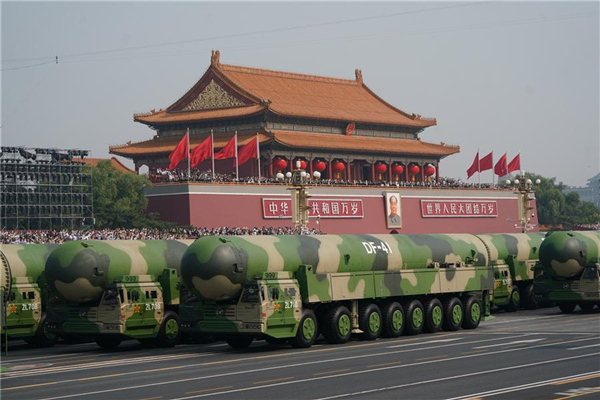
The US has recently been strengthening its military presence around China by constantly sending military vessels to waters off the Xisha islands, intensively dispatching bombers into the Taiwan Strait, and claiming to deploy land-based cruise missiles in the Asia-Pacific to counter "missile threats" from China. Against this backdrop, voices calling for China to enhance nuclear capabilities have begun to emerge.
The military expert Song Zhongping said on May 8 that China should keep building "small and lean" strategic nuclear forces and appropriately increase the number of nuclear weapons to meet its actual need fornational security. Yang Chengjun, an expert on nuclear arms control, held that China is fully capable of safeguarding its nuclear security despite its much smaller nuclear arsenal than other nuclear powers.
It is highly necessary for China to develop new strategic nuclear weapons for two reasons. First, the world is currently unsafe. The US is making new-generation nuclear weapons that pose grave threats to China; second, China's nuclear weapons have to be updated and upgraded constantly, said Song Zhongping in an interview with the Global Times, adding that "we are maintaining a small and lean nuclear force both in terms of strategy and quantity", which is critical for China to forge a strategic nuclear force with its characteristics.
Nuclear weapons today tend to be downsized with low pollution and diverse launching pads, according to Yang Chengjun, a Chinese expert on nuclear strategy and arms control. He said nuclear weapons before the 1990s could usually have a yield equivalent to millions or tens of millions of TNT, causing massive damages on an extensive scale, so the use of themmay incurcondemnation from the international community for the potential immense collateral damages they caused.
"If the capital city or a major city of a country is targeted by such nuclear weapons, the target would be razed to the ground, a cost no country could afford," said Yang, adding that as far as nuclear weapon development is concerned, major nuclear powers including the US and Russia have successfully developed tactical weapons such as neutron bomb and depleted uranium bomb. "Although they haven't been tested in a real war, the sense of hostility amongst those countries is getting stronger because they believe tactical nuclear weapons can be used anytime."
When the US is using small-equivalent nuclear weapons as the main strike force to deter China, China should develop more advanced nuclear weapons in response, said Song, who pointed out that we should not only improve the quality, but also increase the quantity to effectively curb America's attempt to conduct nuclear strike and deterrence against China.
"We have no intention of engaging in a nuclear arms race with the US, but increasing the scale of our nuclear arsenal to an appropriate level meets the actual need for China's national security as we are faced with ever more threats, especially from the US," he added.
Regarding the number of nuclear weapons, Yang Chengjun held a more prudent view. He told the reporter that China's nuclear strategy is "being concise and effective". "Being concise means our nuclear arsenal and troops are small in scale, while being effective means on the premise of not being the first one to use such weapons, we are able to withstand the first wave of a nuclear strike from the enemy and launch effective counterattacks." If the US were to launch nuclear strikes against China, we didn’t need more nuclear weapons than it because it’s enough as long as our existing ones can defeat it in the counter strikes.
Yang especially emphasized the meaning of "effectiveness" of nuclear weapons. "What should we do to achieve 'effective'? How many nuclear weapons do we need? What kind of defense penetration capability, destructive effects, and strike precision do we need to be effective? This is a big topic that covers too many connotations." A core idea of China's nuclear policy is that we will never compete with nuclear powers in quantity and scale. "We have the third-largest number of nuclear warheads, but there is no problem with our production capacity and potential."
Speaking of the quality of China's nuclear weapons, Song believed they are not as good as those in the US and Russia, as a result, it is necessary for China to enhance the quality and quantity of its nuclear arsenal and appropriately increase nuclear forces. But Yang said China's nuclear weapons have "no quality problem". "Our nuclear weapons have no problem regarding the capability of survival, nuclear strike resistance, and defense penetration. If any country dares to even think of using nuclear weapons against China, we have full confidence to launch nuclear retaliation that will wipe it off the ground."
"China never hopes a nuclear war to happen in human history," said Yang, "we don't invite trouble, but we are not afraid of it when trouble comes our way." China has always attached great importance to nuclear capability development and organized rigorous research, demonstration, and calculation of our nuclear forces in terms of quantity and scale. A wide array of factors is taken into consideration in this process, including quantity, survival capability, probability of successful launch and detonation, defense penetration capability, service life, carrier, basic power unit, production capacity, and development potential.
According to Yang, China's nuclear thoughts, policies, and strategy, as well as the purpose of nuclear weapon development and the principle of its use are clear and definite. We have much fewer nuclear weapons than nuclear powers, but they are very effective and China has the means and capability to safeguard its nuclear security.
Disclaimer: This article is originally published on huanqiu.com and translated from Chinese into English and edited by the China Military Online. The information, ideas or opinions appearing in this article do not necessarily reflect the views of eng.chinamil.com.cn.













